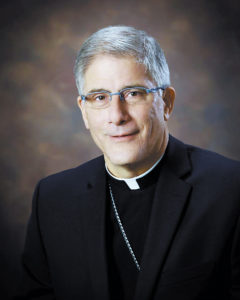By Bishop Joseph Kopacz

Bishop Kopacz
The month of November is upon us with the deepening of darkness at day’s end and, spiritually, with the feasts of All Saints and all Souls that remind us that the Light of the World always shines in the darkness. Much more ardently in November and early December, the Catholic Church looks beyond what is seen to what is unseen when eternal life unfolds in its fullness. Ultimately, our citizenship is in heaven and eternal life envelops us.
Yet, in every season, the Church never is given a pass on living the Gospel with the mind and heart of the One who will come to judge the living and the dead. In fact, in November and December with the onset of the holidays, the Church along with many other organizations and people of good will, ramps up its efforts to serve the vulnerable poor and marginalized and to be in solidarity with all. We have some wonderful saints in November who are a lamp for our feet to walk with the Lord more faithfully in our generation.
Saint Martin de Porres, whose feast day is November 3 each year, is one such disciple of the Lordwho can inspire many in our world to raise up those ensnared by darkness. Martin was born in Lima, Peru on December 9, 1579. He was the illegitimate son to a Spanish gentlemen and a freed slave from Panama, of African or possibly Native American descent. At a young age, Martin’s father abandoned him, his mother and his younger sister, leaving Martin to grow up in profound poverty. After spending just two years in primary school, Martin was placed with a barber/surgeon where he would learn to cut hair and to apply the medical arts.
As Martin grew older he experienced a great deal of ridicule for being of mixed-race. In Peru, by law, all descendants of African or Indians were not allowed to become full members of religious orders. However, not even unrelenting hardship and abandonment could separate Martin from the love of Jesus Christ. Gradually his resolute commitment to pour out his life in the footsteps of the Master overcame the prejudices and racism of his culture and the Church. Until the time of his death at 60 years old in 1639 he was praised for his unconditional care of all people, regardless of race or wealth. He took care of everyone from the Spanish nobles to the African slaves. Martin didn’t care if the person was diseased or dirty, he would welcome them into his own home. Martin’s life reflected his great love for God and all of God’s gifts. This is the Church at work.
Mother Teresa-like, in every corner of the world, the incarnate Lord washing the feet of his apostles and pouring out his life on the Cross. In yesterday’s scripture readings at Mass, Saint Paul in his first letter to the Thessalonians, in the earliest recorded written word in the New Testament, about 50 A.D., reveals the Gospel charism which has transformed lives and cultures for nearly 2000 years.
“Brothers and sisters: We were gentle among you, as a nursing mother cares for her children. With such affection for you, we were determined to share with you, not only the gospel of God, but our very selves as well, so dearly beloved had you become to us. You recall, brothers and sisters, our toil and drudgery. Working night and day in order not to burden any of you, we proclaimed to you the gospel of God.” (1Thes 2, 7b-9)
The witness of Saint Paul and Saint Martin, of Mother Teresa and of all the saints, Catholic and non-Catholic, canonized or not, is the leaven of loving service in our Church and in our world that will overcome the hatred and violence, the greed and the lust that continue to poison the life-blood of our nation and world. With a greater sense of urgency in the face of encroaching darkness, in nature and at the hands of those driven by evil and along with the countless opportunities for generosity and solidarity that beckon us in the time ahead, may we heed the call of the Lord to live the Gospel and value the things that really matter.
